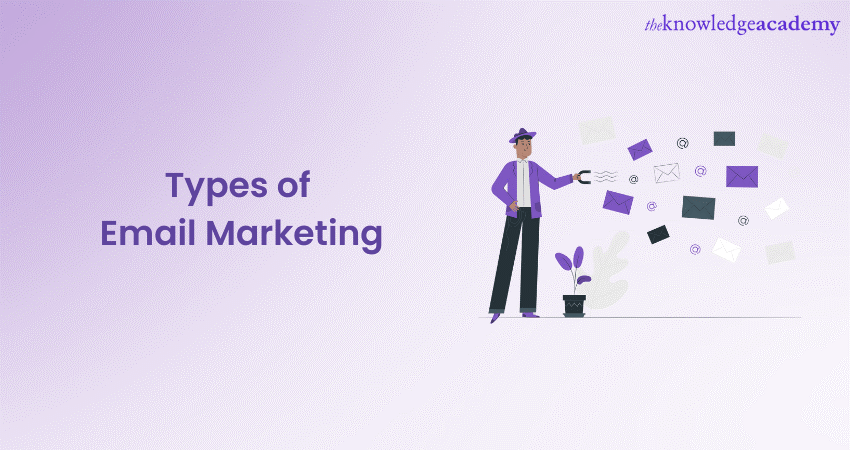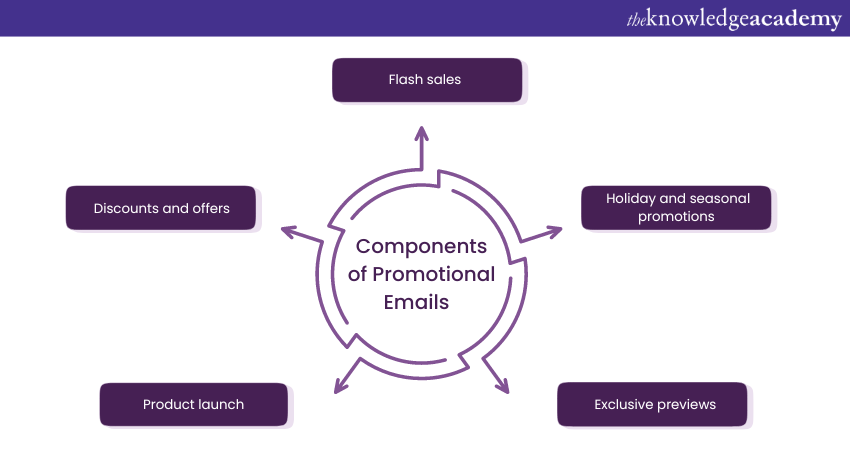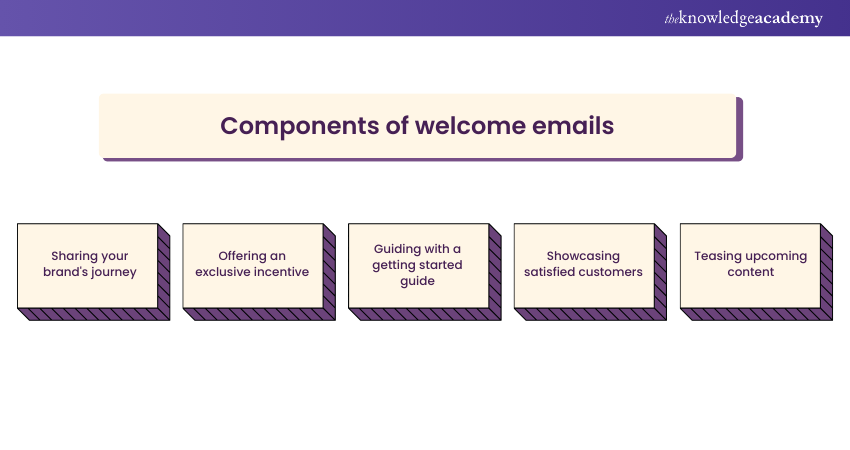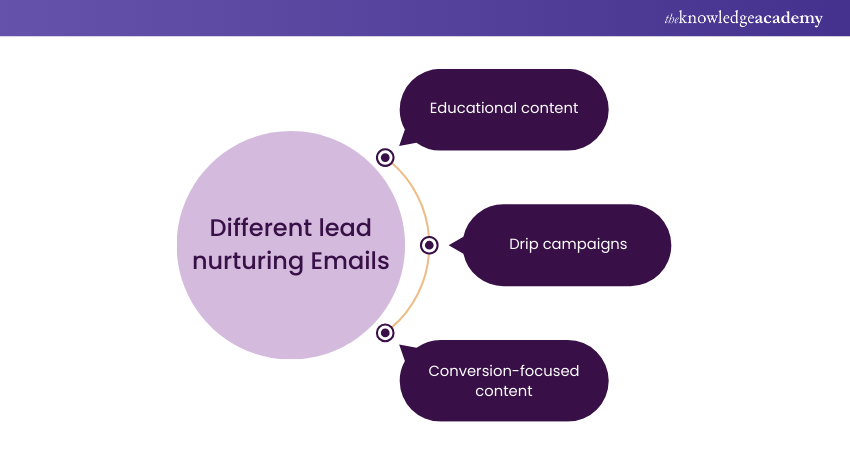We may not have the course you’re looking for. If you enquire or give us a call on +44 1344 203 999 and speak to our training experts, we may still be able to help with your training requirements.
Training Outcomes Within Your Budget!
We ensure quality, budget-alignment, and timely delivery by our expert instructors.

When it comes to marketing, Email Marketing stands as a steady strategy for businesses to engage with their audience. From promotional emails to transactional emails, it consists of many different types. Understanding these different Types of Email Marketing can help you elevate your marketing endeavours.
According to Statista, Email Marketing still remains a popular marketing channel used by more than 80 per cent of industry experts. So, incorporating this in your marketing campaigns can help you achieve better results. If you are interested in understanding various Email Marketing types, then this blog is for you. In this blog, you will learn about the different Types of Email Marketing in great detail. Let’s dive in deeper to learn more about it!
Table of Contents
1) Understanding Email Marketing
2) Different Types of Email Marketing
a) Promotional emails
b) Transactional emails
c) Welcome emails
d) Newsletter emails
e) Abandoned cart emails
f) Re-engagement emails
g) Segmented email campaigns
h) Lead nurturing emails
i) Feedback and review emails
j) Automated email workflows
3) Conclusion
Understanding Email Marketing
Before diving into the various Types of Email Marketing, let's first understand what Email Marketing is. Email Marketing is the practice of mailing your targeted and perfectly relevant emails to a chosen group of recipients. Its goal is to attain specific marketing objectives. These objectives range from brand awareness and customer engagement to lead generation or even sales conversion.
Different Types of Email Marketing
Email Marketing is an all-rounder and strong tool. It enables businesses to connect with their target audience. It also helps in building nurture relationships and achieve the required marketing goals. Within the canal of Email Marketing – there are several different types of strategies that businesses can employ to effectively engage their subscribers. Let’s explore what are the Types of Email Marketing and how each strategy can contribute to a successful email campaign below:
1) Promotional emails
Promotional Emails are designed to grab the recipient's attention and encourage immediate action. These emails focus on showcasing products, services, or special offers to drive sales and conversions. Promotional emails can take various forms, and let’s explore some of them:

1) Product launch: Presenting a new product or service to your audience, mentioning its features, benefits, and value.
2) Discounts and offers: Notify subscribers about special discounts, buy-one-get-one deals, or percentage-off promotions.
3) Flash sales: Generate excitement by announcing short-duration sales, often lasting only a few hours or a day.
4) Holiday and seasonal promotions: Capitalise on holidays or seasonal events with thematic promotions and offers.
5) Exclusive previews: Provide subscribers with early access to upcoming sales or product releases as a reward for their loyalty.
Incorporating well-crafted promotional emails into your Email Marketing strategy can create excitement around your offerings. It also encourages engagement and ultimately contributes to achieving your business objectives. By focusing on delivering value and addressing the recipients' needs, you can build a loyal customer base and drive revenue.
2) Transactional Emails
Transactional Emails play a vital role in providing essential information and confirming specific actions. These emails are triggered by a user's interactions with your website or platform. Here are the different types of Transactional Emails:
1) Order confirmations: Send these emails immediately after purchase. Plus, it provides customers with a summary of their order, payment details, and estimated delivery times.
2) Shipping notifications: Informing customers about the status of the shipment, including tracking information and delivery updates.
3) Account creation: When customers create accounts on your platform, send them a welcome email with login information and a brief introduction to your services.
4) Password resets: Triggered when users request password resets, these emails provide instructions for resetting passwords and regaining account access.
5) Subscription confirmations: For newsletters or subscription services, these emails confirm users' successful subscriptions and often include a welcome message.
Transactional Emails serve as more than just confirmations. They present opportunities to provide additional value, guide customers, and strengthen the overall customer experience. By focusing on accuracy, relevance, and clear communication, companies can enhance customer satisfaction and build lasting relationships.
3) Welcome Emails
Welcome Emails play a crucial role in introducing your brand to new subscribers and initiating a positive foundation for your ongoing relationship. By crafting well-thought-out and engaging Welcome Emails, you can effectively establish meaningful connections and nurture long-lasting customer loyalty. Let’s explore some Email Marketing Examples of welcome emails below:

1) Sharing your brand's journey: Introduce recipients to your brand's narrative, values, and unwavering commitment to delivering top-notch products or content.
2) Offering an exclusive incentive: Extend a gesture of appreciation by providing new subscribers with an exclusive discount or special offer as a token of gratitude for joining your community.
3) Guiding with a getting started guide: Offer valuable tips, guidance, and insights to help new subscribers make the most out of their subscription or initial purchase.
4) Showcasing satisfied customers: Highlight positive customer reviews or testimonials to create credibility and build trust with your new subscribers.
5) Teasing upcoming content: Offer a sneak peek into the type of content that subscribers can expect to receive in future emails, generating anticipation and excitement.
Welcome emails pave the way for positive experiences and lasting engagement. Start off strong by offering a warm, informative, and value-driven welcome to lay the groundwork for building robust relationships. This will help in nurturing brand loyalty and setting the stage for thriving Email Marketing endeavours.
Harness the power of emails with our Email Marketing Training. Sign up today!
Newsletter Emails
Newsletter Emails are a valuable way to provide consistent content that informs, educates, and entertains your subscribers. These emails focus on delivering relevant information and maintaining ongoing engagement. Newsletter emails typically include the following elements:
1) Curated content: Sharing articles, blog posts, videos, or industry news that align with your subscribers' interests.
2) Educational resources: Offering how-to guides, tutorials, and tips related to your niche.
3) Engaging visuals: Incorporating visuals to enhance the appeal and readability of your content.
Newsletter Emails establish your brand as an authoritative source in your industry and keep subscribers engaged over time.
5) Abandoned cart emails
Abandoned Cart Emails target users who have shown interest in your products but didn't complete their purchase. These emails remind them of the stuff left in their cart and encourage them to finalise the transaction. Abandoned cart emails include the following elements:
1) Product reminders: Displaying the abandoned items with images, descriptions, and prices.
2) Incentives: Offering discounts, free shipping, or bonuses to entice users back to complete the purchase.
3) Clear call to action (CTA): Providing a prominent link to the cart for easy checkout.
Abandoned Cart Emails recover potentially lost sales and remind clients of items they were interested in.
6) Re-engagement emails
Re-engagement Emails are sent to inactive subscribers in an effort to revive their interest and encourage interaction. These emails can help clean up your email list and improve overall engagement rates. Let’s explore the key elements of re-engagement emails:
1) Engaging subject lines: Craft compelling subject lines that grab recipients' attention and entice them to open the email.
2) Personalisation: Address recipients by their names and reference their past interactions with your brand.
3) A reminder of value: Remind recipients of the value your brand offers and how their engagement can benefit them.
4) Special offers and incentives: Provide exclusive offers, discounts, or rewards to incentivise re-engagement.
5) Call-to-action (CTA): Include a clear and enticing CTA that prompts recipients to take a specific action, such as clicking a link or visiting your website.
6) Opt-out option: Offer recipients the option to update their email preferences or unsubscribe if they no longer wish to receive emails.
Re-engagement emails offer a valuable opportunity to reconnect with subscribers who may have lost interest.
7) Segmented Email Campaigns
Segmented Email Campaigns involve dividing your email list into specific groups based on certain criteria. This approach allows you to tailor your messages to different segments, resulting in more personalised and relevant content for your subscribers. Here are some key strategies for this type of Email Marketing campaign:
1) Benefits of segmentation: Discuss the advantages of sending targeted content that resonates with different subscriber segments.
2) Types of segments: Explore various segmentation criteria, such as demographics, location, purchase history, and engagement level.
3) Case studies: Share examples of businesses that have successfully implemented segmented email campaigns and achieved higher engagement rates.
Segmented Email Campaigns can significantly improve the effectiveness of your emails by delivering content that speaks directly to your recipient's interests and preferences.
8) Lead nurturing emails
Lead nurturing emails focus on guiding potential customers through the various stages of their buyer's journey. By providing valuable content at each stage, you can build trust, establish authority, and eventually convert leads into paying customers. Here are the various types of Lead nurturing emails.

1) Educational content: Highlight the importance of offering informative content that conveys the pain points and questions of potential customers.
2) Drip campaigns: Explain the concept of drip campaigns, where a series of emails are sent over time to gradually nurture leads.
3) Conversion-focused content: Discuss how to create compelling calls to action and offers that encourage leads to take the next step.
Lead nurturing emails help you maintain engagement with your audience and increase the likelihood of converting leads into loyal customers.
9) Feedback and Review Emails
Feedback and Review Emails provide an avenue for clients to share their experiences, opinions, and feedback about their interactions with your brand. Positive reviews and endorsements can enhance your credibility and influence potential customers. Let’s explore some Email Marketing Tips on how you can achieve that:
1) Request for feedback: Explain how to politely ask customers for their feedback and reviews after purchase or interaction.
2) Showcasing reviews: Describe the benefits of featuring positive reviews and testimonials in your emails and on your website.
3) Responding to feedback: Provide tips on how to engage with customer feedback, both positive and negative, to demonstrate your brand's commitment to improvement.
Feedback and review emails not only help you gather valuable insights but also showcase the satisfaction of your existing customers to potential ones.
10) Automated Email Workflows
Automated Email Workflows are a cornerstone of effective Email Marketing, enabling businesses to engage with their audience in a timely and personalised manner. These workflows are a series of pre-scheduled emails triggered by specific actions or events, allowing you to deliver relevant content, nurture leads, and guide customers through various stages of their journey. By automating these processes, you can ensure consistent communication while saving time and effort. Let’s explore the key benefits of automated email workflows:
1) Personalised communication: Tailor your emails to individual recipients based on their behaviours, preferences, and interactions.
2) Timely engagement: Respond to user actions promptly, enhancing user experience (UX) and driving conversions.
3) Efficiency: Automate routine tasks, freeing up resources to focus on other aspects of your promotion strategy.
4) Consistency: Ensure a consistent and cohesive brand message across all interactions with your audience.
Overall, understanding the different Types of Email Marketing strategies is crucial for crafting effective campaigns that resonate with your audience. Whether you're aiming to boost sales, nurture relationships, or re-engage subscribers, each type of email serves a specific purpose. By incorporating these marketing approaches, you can create a well-rounded and successful email campaign that drives results for your business.
Transform your marketing budget management with our Marketing Budget Masterclass. Sign up now!
11) Survey Emails
Survey Email is a data collection method. It is used to collect quantitative data from customers. Along with that it includes surveys and questionnaires sent via email. Recipients here, can answer the surveys directly in embedded questions in the email body. This can be is done through email responses, or on the websites. Survey emails allow gathering feedback from potential customers. This feedback is about what type of content matters to the audience, and what might hold them back from making a certain purchase.
12) Milestone Emails
Milestone Emails create a chance for businesses to connect with their customers by highlighting personal milestones or about their relationship with your company to the customer or Milestone emails typically express appreciation for your customers’ contribution toward your achievements and success or for celebrating a specific occasion like a birthday, anniversary, or holiday.
13) Dedicated Emails
Dedicated Emails are sometimes called standalone emails. They are sent to inform specific offers. For example, dedicated emails can let customers know about a new resource published or invite them to take part in a virtual or in-person event. These emails have a very specific CTA, making them quicker, easier to remember and act upon. These emails aren’t sent as regularly as some of the others on this list because they’re dependent on the offering or event you’re promoting.
14) Drip Campaigns
Drip Campaigns are series of automated mails that are sent to the target audience on your website. They are usually personalised as per the customer’s data with specifications on their previous actions. They are predominantly used for placing an order, attending a specific event or cases such as abandoning a shopping cart.
Conclusion
We hope you read and understand the different Types of Email Marketing. Incorporating various Email Marketing types enriches customer engagement and drives business success. Optimising your strategies to match recipient needs promotes strong connections and ultimately propels your brands toward growth.
Equip yourself for marketing mastery with our Marketing Training. Sign up today!
Frequently Asked Questions

The five Ts of Email Marketing refer to five key considerations. They can make Email Marketing campaigns successful. These Ts are targeting, testing, timing, triggers and tracking.

The four Cs of email components includes clear, concise, and competent emails.

The Knowledge Academy takes global learning to new heights, offering over 30,000 online courses across 490+ locations in 220 countries. This expansive reach ensures accessibility and convenience for learners worldwide.
Alongside our diverse Online Course Catalogue, encompassing 17 major categories, we go the extra mile by providing a plethora of free educational Online Resources like News updates, Blogs, videos, webinars, and interview questions. Tailoring learning experiences further, professionals can maximise value with customisable Course Bundles of TKA.

The Knowledge Academy’s Knowledge Pass, a prepaid voucher, adds another layer of flexibility, allowing course bookings over a 12-month period. Join us on a journey where education knows no bounds.

The Knowledge Academy offers various Marketing Courses, including Content Marketing Courses, Web Analytics Courses, Conversion Rate Optimisation Training, and Explainer Videos Training. These courses cater to different skill levels, providing comprehensive insights into Content Management.
Our Digital Marketing blogs cover a range of topics related to Marketing advancements, offering valuable resources, best practices, and industry insights. Whether you are a beginner or looking to advance your Marketing skills, The Knowledge Academy's diverse courses and informative blogs have you covered.
Upcoming Digital Marketing Resources Batches & Dates
Date
 Email Marketing Course
Email Marketing Course
Fri 7th Feb 2025
Fri 4th Apr 2025
Fri 6th Jun 2025
Fri 8th Aug 2025
Fri 3rd Oct 2025
Fri 5th Dec 2025







 Top Rated Course
Top Rated Course



 If you wish to make any changes to your course, please
If you wish to make any changes to your course, please


